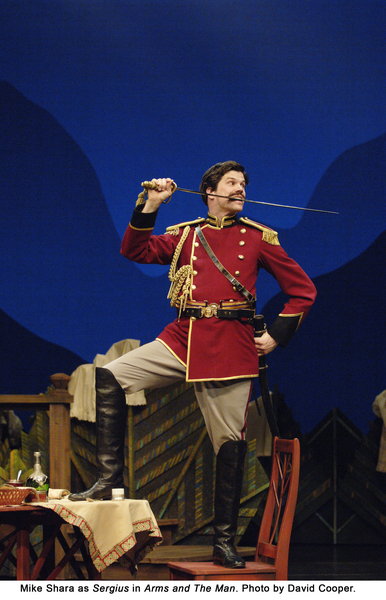Love and Glory; the wondrous madness of it all.
‘It’s still the same old story; a fight for love and glory; a case of do or die.’
It is 1885 and there’s trouble in the Balkans – as usual! Sergius, so ambitious for glory, leads a foolhardy cavalry charge against the Serbian machine guns. He’s not to know that the Serbians had been issued the wrong ammunition and could not retaliate. So his glorious charge scatters the enemy, who disperse into the countryside. The population are advised to keep their doors and windows bolted, but Bluntschli, a Swiss mercenary , shins up a drainpipe into stumbles into the bedroom of Raina, who is not only the daughter of the Bulgarian commander , Colonel Petkoff, but is also betrothed to the heroic Sergius.
Raina is moved by Bluntschli’s fear. She gives him chocolate creams to eat and hides him. He falls asleep on her bed. Raina and her mother, Catherine, then help him escape by disguising his uniform under their father’s old coat.
A few months later, peace breaks out and Petkoff and Sergius return from the war. Bluntschli, who has been promoted captain, calls to return the coat. It’s the stuff of farce. Petkoff and Sergius must not know their wife and fiancée concealed a deserter, but how can the return of the missing coat with Raina’s signed photograph,’ to my chocolate cream soldier’, in the pocket. But Petkoff and Sergius are more bluster than brain. They welcome Bluntschi as an honourable foe and use his practical abilities to help them organise the demobilisation of their troops and horses.
Bluntschli is a professional. For him, war is a job of work. He keeps his head down, does his duty and waits for the peace. By comparison, his erstwhile opponents appear ridiculously pompous. Petkoff is actually scared of his troops and wants nothing more than to retire to his country house. Sergius is a liability. He would sacrifice the safety of his troops in his desperate quest for personal glory. So much for honour!
But what of love? Sergius is not in love with Raina; he does not know or understand her. Besides, he can’t keep his hands off Louka, Raina’s wily, cynical maid, who sees the little boy inside and is more of a challenge. Raina, meanwhile, has developed a soft spot for her chocolate cream soldier; he understands her and makes her laugh. Even her parents are won over when they learn of his inheritance.
In ‘Arms and the Man’, George Bernard Shaw points a satirical Irish finger at the ridiculous hypocrisy of honour and romance. As Bluntschli explains, sensible people are frightened, they lie, they deceive, they pretend. They may like to think themselves honourable but faced with mortal danger, they will do all they can to stay alive. Only the mad will sacrifice everything for love and glory.
What Shaw is writing about, in cold psychoanalytical language, is narcissism. Sergius doesn’t love Raina; he is merely in love with the reflection of his own image in her eyes. The beautiful and spirited Raina makes him feel much more of a man than he knows he really is. He lacks confidence and can only gain self esteem by exciting the admiration of others. He lives in the regard of others. It is his life blood. Without it he dies. His need is so desperate, he will risk everything, even the lives of his men, the future of his country.
He even feels compelled to seek regard in the cynical arms of Louka, though he knows that she will be the one to destroy him. An overweening desire for fame and celebrity is always accompanied by a tendency to self destruct. Think of George Best, Gary Glitter, Paul Gasgoine, Jade Goody.
And for Raina, the commanders daughter who cannot go to war herself, Sergius is the embodiment of her own inbred projections of bravery and honour, the only man worthy of her love; it’s glory by proxy. The narcissistic love object has to be impressive; it doesn’t work otherwise. Raina is in love with how the attentions of so brave a man can make her feel adorable, admirable, desirable, loveable; all a self centred woman could even want.
So are we to believe that romance and glory are but the delusions of a fragile psyche, make believe; the stories we tell ourselves in order to conceal a reality we can’t accept. Bluntschli explains that humanity is never that wonderful or glorious, but he’s an administrator, the son of a hotel owner. But do we always want to be that sensible? There’s no meaning in that and life without meaning is not worth living. Don’t we need make believe too? If not, what would be the point of literature, music, the visual arts? The moments of madness, falling in love, crazy projects, bring us life and permit change. Banish them and we become depressed and die a little more. But contain them, allow our healthy narcissism, our self confidence and esteem to receive nourishment of novelty from friends and family and who knows, we could even be happy.
‘The world will always welcome lovers. As time goes by.’



